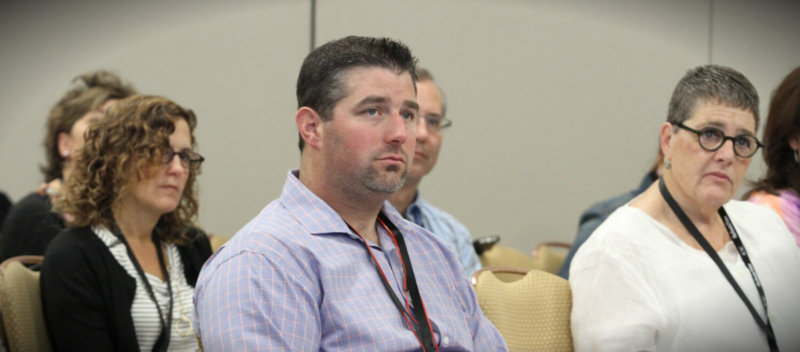ATLANTA — With two youngsters in tow for Sunday Mass, things can get forgotten, like cash, which Ryan Johnson admitted he rarely carries.
He’d love the option to use his mobile phone to donate to a cause at the parish on the spur of the moment.
“We like cashless, paperless, checkless,” said Johnson, a millennial Catholic. The family gives money to the church with an automatic electronic check from his bank.
Faith is so important to him that the 35-year-old Johnson knits it together with his career as an energy engineer by nurturing a network of Catholic young professionals with Catholic Charities Atlanta that he hopes to see grow.
Ryan and his wife, Caroline, 30, joined St. Ann Church in Marietta, selecting from five nearby parishes in part because they can use their phones to read its website, keep up to date with parish news by reading an electronic newsletter, and interact with the 2,500 Facebook followers.
“You want to feel like, if I am talking about the parish, the parish is listening. If I’m commenting sometimes (on the Facebook page), I want an answer. I want to be engaged,” Johnson told The Georgia Bulletin, newspaper of the Archdiocese of Atlanta.
The leading edge of millennial-age believers is marrying and starting families. Parishes preparing for the future will evolve to meet the habits of this group, said a panel of four Atlanta millennials at the International Catholic Stewardship Council conference.
The conference drew some 1,100 to Atlanta Sept. 17-20. Church workers and priests attended scores of workshops during those four days on drawing people into a richer faith life.
Panels sharing insights on connecting with this digital native generation, who recently outnumbered baby boomers in the national population, were well attended at the conference.
Churches need to be aware of trends to serve those born after 1980 in effective ways. These young adults use technology to streamline their lives, using mobile payment apps instead of cash, are passionate about issues and want to engage with an authentic and personalized community.
Millennials are increasingly important as they move into adulthood and start families, said Father Andrew Kemberling, pastor of St. Vincent de Paul Church in Denver. The church must train this age group as good stewards since parents are the most generous of its members, he said.
Stewardship is “a way of life for people,” said Father Kemberling, chairman of the International Catholic Stewardship Council. “We want to offer the best of our tradition. We are not going for the dollars. We are going for evangelizing. The point is to save souls.”
Audience members anxious to draw these young adults into the pews and schools left the conference rethinking old ways.
Carol English, who works at St. Joseph School in Marietta, wants these young men and women to think about Catholic schools for their children. But after hearing that mass-marketing pitches fail, she said the school needs to rethink its outreach toolbox.
“We do have to make our online presence a higher priority, above and beyond,” English said, after learning how this tech-savvy generation lives online and relies on social media.
Schools and parishes could rethink events to appeal to millennial interests, replacing an afternoon of golf with a social event, for example, featuring craft beer and food, she said.
In Marietta, St. Ann Church made an investment in 2012 and again in 2016 to hire professionals to design the parish website, said Graham Kuhn, who is responsible for parish communications.
“You shouldn’t have to lower your standards to look at a Catholic church website,” he said in a phone interview.
A site needs to be attractive, engaging and informative to draw people in, he said.
“Our whole angle on everything is we are focused on building for the future,” said Kuhn.
The parish Facebook page can serve as a community bulletin board. Kuhn’s policy is to respond to all comments. When a parishioner who had a bad experience with a ministry posted it online, she received a call and visit from a pastoral staff person to talk, he said. And other parishioners offered words of encouragement.
Kuhn said he sees that as a strength of social media, when parishioners respond to people’s comments to “heal wounds and build unity.”
In the hotel conference room, a standing-room-only crowd listened to back-to-back sessions on millennials, the generation born between 1980-2000. The first session focused on starting ministries targeting them.
Retaining Catholic millennials is increasingly a challenge. The number of people who identify as having no religious affiliation continues to rise. Fewer people in their 20s and 30s are interested in the Catholic Church. In 2014 the Pew Research Center found only 16 percent of millennials called themselves Catholic versus 23 percent of baby boomers.
For Abby Byron-Goslin, who works in the Diocese of Savannah, these adults in their 20s and 30s have gifts to be tapped to serve the church. She began a ministry called To Be Catholic and serves as the director of campus ministry in Savannah.
Millennials, like others before them, want answers to questions of identity and to belong to a community, she said. “Who they are and whose they are? They are children of God and they are his,” she said.
She believes millennials should be integrated into the parish community, serving in ministries, not an island by themselves.
Byron-Goslin said church leaders could do a better job building bridges starting from the youngest Catholics learning the faith and going up to college graduates. The problem is people leave the faith when there are gaps between ministries and some 80 percent of believers stop attending church in college, she said.
Janice Givens, a young adult pastoral leader who attends St. Brigid Church in Johns Creek, told the crowd there are people in their 20s and 30s in the pews just waiting for a nudge to come together.
“If you throw the net, you are going to get a ton of fish. Nobody is throwing the net,” said Givens, who funded Go FISH Outreach.
John Lanier, executive director of the Ray C. Anderson environmental foundation, said he gives to causes if an organization explains how his family’s support changes lives.
“We are all issue driven. Our issues are diverse,” he said. “It’s got to be something you can connect to.”
Jeff Adams, a corporate real estate lawyer, said he values authenticity, so parishes that treat him impersonally are turnoffs.
If the vision for a parish and leadership is engaging, “you have my money, you have my time, you have my attention,” he said.
Copyright ©2017 Catholic News Service / U.S. Conference of Catholic Bishops.


